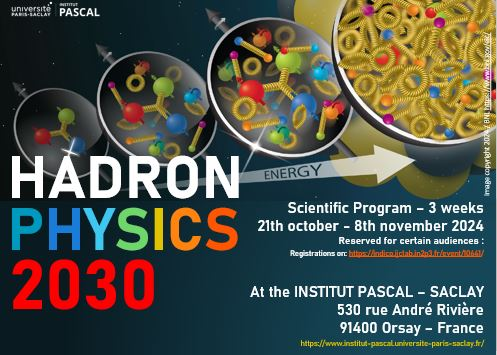Hadron Physics 2030
The 2030 decade will see the upgrade of existing hadron physics facility, such as Jefferson Laboratory (JLab) and the construction of new ones, such as the US Electron-Ion collider (EIC). Because of their widely different kinematic ranges, both JLab and EIC reveal themselves as relevant facilities to study hadron physics in the 2030, with different physics programs. However, some questions are common to both facilities and physics case. Among them let us highlight the following one:
What are the best strategies to extract GPDs and TMDs from experimental data with a good control on theoretical systematic uncertainties?
The relevance of future experimental programs is strongly entangled with their ability to provide new sets of data able to deeply impact phenomenological studies, by smoothing sharp technical difficulties arising for instance from ill-posed inverse problems. Therefore, to ensure that these discussions take place and that a synergy emerges on the common questions, we present a joint JLab-EIC program to tackle the path to the hadron physics of the 2030 decade.
The first week will present a strong emphasis on theory side, especially in a perspective of hadron structure at the EIC. The schedule is expected to be rather dense, though the organisers will make sure that sufficient discussion time will be allowed so that technical barriers can be lifted by small groups. The theory discussion will focus on Lattice-QCD, GPDs, TMDs and the way to go extend our understanding of the 3D structure from the valence region to the high-energy one. On the JLab side, discussion regarding electroweak processes and beyond standard modele physics will take place. A common topic will be the one of meson structure, at JLab and EIC.
The second week will be the real merged week, handing over smoothly the leadership from theorists to experimentalists. We plan to organise summary talks of the first week, highlighting for the joining experimentalists the outcomes of the theory discussions, in order to feed into their own strategy on the design of future upgrades of the Jefferson Laboratory facility. In parallel to the experimental discussion, we expect a continuing theory effort, especially regarding the study of Generalised Parton Distributions. The presence of such theorists through the second week will offer the possibility of joined discussion sessions.
The third week will be dedicated to the writing of the physics case of the future upgrades of Jefferson Laboratory within a workshop mode. This week will see a important use of remote presentation tools, to ensure daily feedback from people located at Jefferson Laboratory. Specific session will be dedicated to the writing of a scientific report, wrapping up the discussions held at IPa.
We will also propose a public Lecture during one of the first two weeks, dedicated to the students of the Université Paris-Saclay.
Cédric Mezrag (CEA), Éric Voutier (IJCLab- IN2P3) for the organising team

